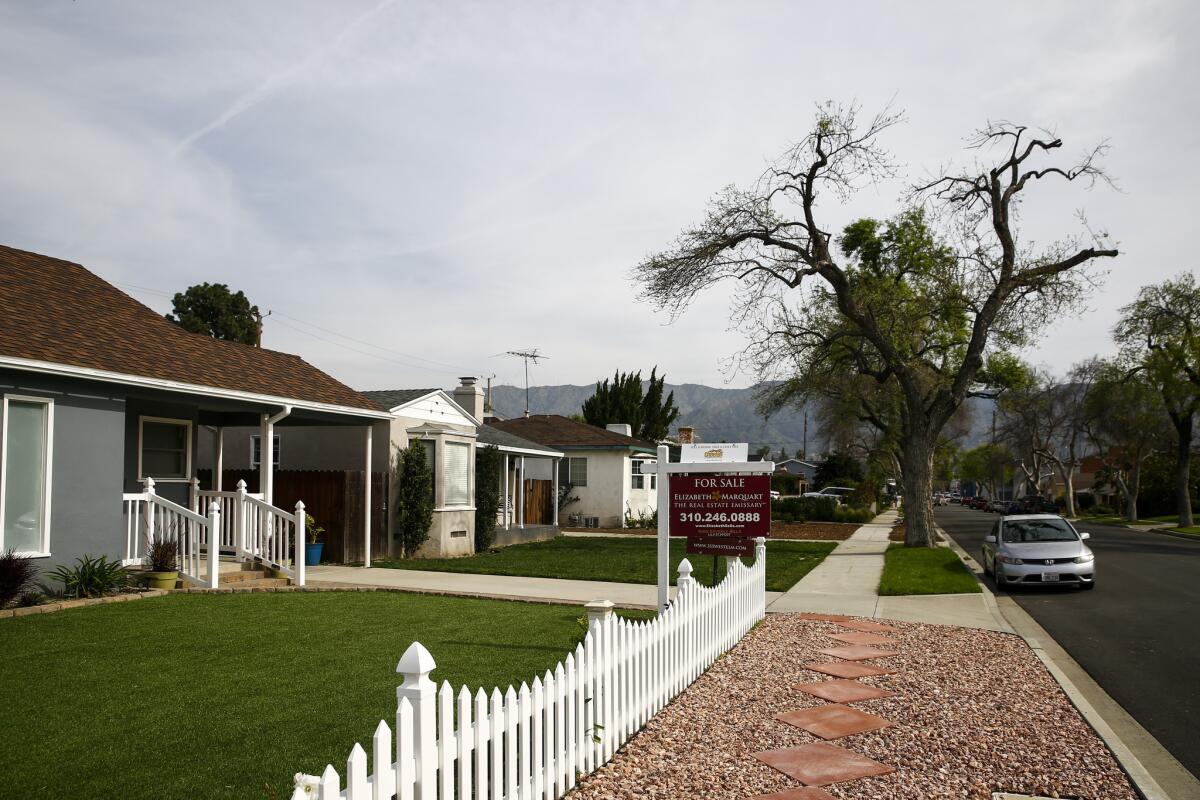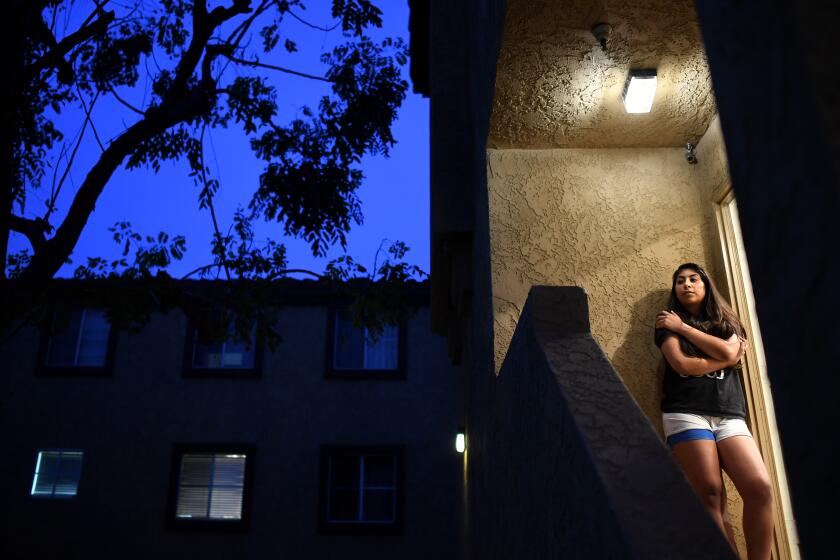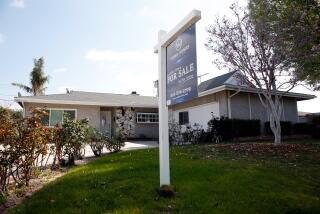Dead deals, slashed prices: Coronavirus drags down Southern California home sales

- Share via
At the start of 2020, the Southern California housing market was heating up, juiced by cheap money and a growing economy.
Then a global pandemic hit.
Deals are now falling out of escrow. Sellers are cutting prices. Certain types of financing are drying up.
As Rick Cirelli, a mortgage broker in Laguna Beach, put it: “Everybody is backing out.”
For now, the evidence is largely anecdotal. Today’s environment won’t show in home sale reports until next month at the earliest. But in the data that are available, there are growing signs of a pullback.
Many California businesses have shuttered to limit the spread of the coronavirus, but construction continues after being deemed essential.
The Mortgage Bankers Assn. reported mortgage applications for a purchase fell 23% in California last week compared with a week earlier. And a California Assn. of Realtors survey from early March found a quarter of agents had clients hold back from buying or selling because of the coronavirus outbreak.
A week later, the group conducted a follow-up survey: The share of agents with a seller holding back had jumped to 45%; more than half had a buyer who pressed pause.
Then came Gov. Gavin Newsom’s stay-at-home order.
“Referrals in from Realtors for new purchases … that pretty much turned off,” said Christopher Fenoglio, Southern California regional manager for Finance of America Mortgage. He pinpointed the change to around the time of the order.
Ultimately, the hit to the housing market depends on how long the virus lingers and how much economic damage it causes — both through deaths and measures to prevent a catastrophic loss of life.
Prices might not yet be dropping as sharply as sales. If sellers think this is a temporary crisis, many could be inclined to hold off adjusting their listing price.
For context, research from Zillow shows that during the 2003 SARS outbreak that lasted for several months in Hong Kong, the city’s housing market essentially froze in place. Home prices didn’t fall much, while the number of transactions plunged as people kept their distance from one another to save lives.
“After the epidemic was over, transactions snapped back to normal volumes,” Zillow chief economist Svenja Gudell wrote in a recent report, noting the bounce back corresponded with a similar rebound in gross domestic product.
The SARS outbreak killed 774 people worldwide. The death toll from COVID-19, the disease caused by the novel coronavirus, already has surpassed 1,500 in the United States alone. In New York City, doctors and nurses at some hospitals are growing overwhelmed. At one, the New York Times reported, “a refrigerated truck has been stationed outside to hold the bodies of the dead.”
Los Angeles Mayor Eric Garcetti has said the city could soon experience the levels of cases erupting now in New York. Newsom has announced that more than 1 million Californians have applied for unemployment benefits this month.
On Thursday, when the U.S. was supposed to be enjoying baseball’s opening day, the country surpassed China as the place with the most reported coronavirus cases.
Government is trying to stanch the economic damage. The U.S. Senate passed a $2-trillion relief package Wednesday that includes business loans, direct cash payments to consumers and increased unemployment benefits. The House passed the bill Friday morning, and President Trump signed it into law.
Coronavirus unemployment hits a broad swath of industries across California.
For those with federally backed mortgage loans, the bill also includes forbearance and a temporary moratorium on foreclosures, a wave of which depressed prices for years after the 2008 financial meltdown.
“We don’t know how long [the disease] is going to last,” said Richard Green, director of the USC Lusk Center for Real Estate. “Prices will fall, but it’s hard to know how much or for how long.”
Some are already feeling the pinch. Companies such as Redfin and Zillow have stopped purchasing homes to flip, citing market uncertainty.
Cirelli, the Orange County mortgage broker, said buyers are pulling back for a multitude of reasons: fear of being unable to sell their own house, uncertainty about the economy and the plunging value of their investment portfolio.
For others, it’s difficulty in obtaining financing. Kerem Ozguz, 36, and his wife just had a son; they are now in escrow on a $497,000, two-bedroom condo in Irvine. The business consultant was planning on using a so-called non-qualifying mortgage. Those loans typically require less documentation, which makes it easier to qualify for workers like Ozguz who don’t have a W-2 statement to prove income. They are also riskier for lenders and investors.
The other day, Ozguz got a call from his mortgage broker. “He was like, ‘Hey, the loan I was going to put you in doesn’t exist anymore,’” Ozguz said.
Now he is worried the deal will fall apart.
“We are scrambling,” he said.
Keith Gumbinger, vice president of the research firm HSH Associates, said non-qualifying mortgages have dried up because investors who typically purchase the loans from originators “don’t know if they are going to get their money back.”
Remote jobs for the coronavirus era range from teaching to writing to web development.
Jumbo mortgages are more readily available. Those are loans that exceed the limit to qualify for guarantee by Fannie Mae or Freddie Mac; in Los Angeles County, that’s $765,600. But they too have grown more difficult to find.
“From an investor standpoint, there is a preservation of cash and an aversion to risk,” Gumbinger said. “It’s going to be a little bit difficult for time to find” non-qualifying and jumbo mortgages.
Buyers who do have access to financing are finding that some sellers feel the pressure to make a deal.
“We are seeing some pretty amazing last-minute negotiations happening,” said real estate agent Jeff Anderson, who works across Southern California.
One seller offered to hack the $730,000 sale price of a two-bedroom Culver City condo down to $650,000 so the buyer wouldn’t cancel escrow. It wasn’t enough.
“The buyer got cold feet and is canceling,” said Anderson, who oversees the agent handling the deal.
USC’s Green doubted many sales will happen during the pandemic. People are losing their jobs. Others are fearful their livelihood will be next.
That’s not an environment many property owners want to sell into, unless an economic hardship forces their hand. Some sellers are also afraid to let strangers into their home, fearful of a disease experts believe is far deadlier than the flu.
Zillow said the number of new listings now coming onto the market each day in Los Angeles and Orange counties is about 30% below what it was a year ago. That compares with a 4% decline at the beginning of the month.
The near total collapse of tourism has left recreational-vehicle companies — those that rent or sell RVs and the like — scrambling to survive.
“Overall listings haven’t moved much, because there aren’t a bunch being pulled off or bought,” Zillow spokesman Matt Kreamer said.
Still, the market hasn’t completely ground to a halt.
Active Realty, which has offices in Corona, Irvine and downtown San Diego, said it has some canceled escrows. But other deals are moving forward.
“Today, we had five offers come in on one property,” Suzanne Seini, the company’s chief operating officer, said Tuesday. “It just comes down to the fact that if someone needs to move, they are going to still move, and they are going to find a way to do it.”
Stay-at-home edicts complicate the process. The California Assn. of Realtors advises clients to stop in-person marketing or sales activities, such as open houses, to keep in line with the new physical-distancing rules. But there are virtual tours, and many aspects of a transaction can be done online.
In-person signatures and appraisals are being seen as essential financial services that can continue, with notaries and appraisers showing up donned in gloves and a mask.
The Realtor group has even added a coronavirus addendum to its form contracts, so sellers and buyers can plan for potential delays stemming from quarantines or the closure of business and government offices.
Omid Yousofi of Titan Pacific Group in Corona del Mar is among those grappling with the new reality. He represents Ozguz and is still trying to help his client’s young family buy a home.
So far, Ozguz is in the minority.
“The vast majority of my buyers are pulling back and taking a wait-and-see approach,” Yousofi said.
More to Read
Sign up for Essential California
The most important California stories and recommendations in your inbox every morning.
You may occasionally receive promotional content from the Los Angeles Times.









